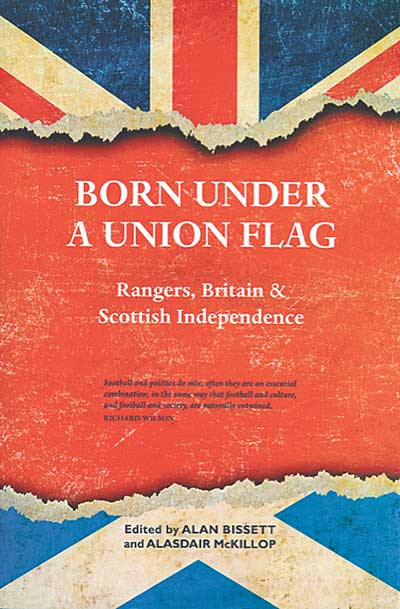 Rangers, Britain & Scottish independence
Rangers, Britain & Scottish independence
edited by Alan Bisset and Alasdair McKillop
Luath Press, £8.99
Reviewed by Gordon Cairns
From WSC 331 September 2014
The editors of Born Under A Union Flag have taken on an ambitious task: to quantify Rangers fans’ relationship not only with Scotland but the United Kingdom as a whole. A difficult terrain to map, as historically the club has been considered the team of a union that may be dissolving. That Rangers are in this position as a Unionist team in a country falling out of love with the UK is due to a particular set of circumstances which occurred at the turn of the last century, when a challenger was sought for a successful team of immigrants. The fanbase of this new champion just happened to be drawn from the Catholic-free zone of the Govan shipyards.
As Scotland has moved from being strongly identified with Britain, the position of Rangers has shifted too, from the establishment team to that of outsiders, while ironically it is the “rebel” club Celtic who have had one of the UK’s most right-wing home secretaries of recent memory, John Reid, on their board. The 14 authors, representing both opinions on the issue of Scottish independence and all bar one fans of the club, examine Rangers’ place in the UK with varying degrees of success, using a mixture of personal experience and historical perspective, with the latter the more persuasive to this non-Old Firm fan.
Historian Graham Walker convincingly charts the shift from Rangers as the establishment team to “becoming at odds with the country as a whole”, and casts light on how the support evolved to deal with this change, illustrated through the recasting of God Save the Queen as a subversive anthem. The song gained popularity in the 1980s as the club fell out of favour with mainstream opinion. Although the purpose is to wind up the anti-monarchy opposition, and I must admit it has this effect on me, Walker describes a rendition of the national anthem to illustrate his argument that many fellow fans are more concerned with showing their loyalty than supporting the team. Rangers’ last game in Europe was a must win against NK Maribor in 2011; as the team pushed for the decisive goal in the last few minutes, the crowd began to chorus the dirge-like anthem rather than the Ibrox roar, destroying the momentum on the pitch while creating an atmosphere of resignation and defeat, and so the team failed to progress.
While calling for a constitution to be created for the club, editor Alasdair McKillop looks to Barcelona as a model. He argues that “Celtic have a morally infused narrative that is entwined with the socio-economic progress of the community”, backing up their claims to be “more than a club”. In my opinion, as Rangers’ estrangement from Scottish society grows and their fans continue to utilise British symbolism and song, they could mirror Barcelona’s “other” club, Espanyol (ie “the Spanish”), and become the quintessentially British club, or that of the outsiders – especially if Scotland breaks from the union.
“Better Together” or “Yes” campaigning pollsters will be sorely disappointed if they read this book hoping to get an insight into how this considerable section of Scottish society might vote on September 18. However what it does do is take the temperature of Rangers fans at an important juncture of Scottish history.